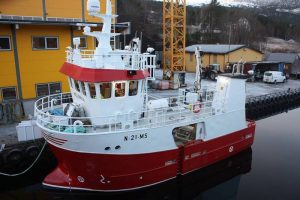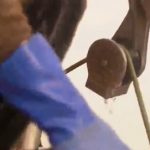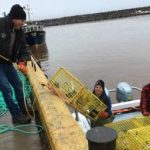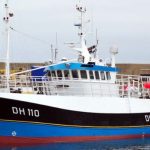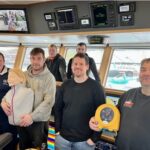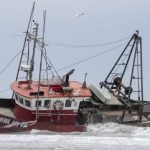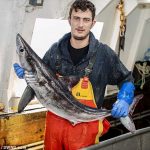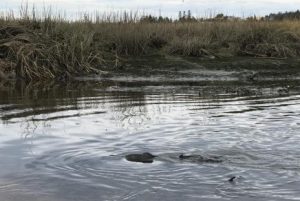Monthly Archives: February 2013
Research shows dogfish are a significant threat to cod
 February 7, 2013 — Dogfish provide significant competition for cod. The estimated biomass of dogfish is 240,000 tons vs. only around 23,000 tons for both Georges Bank and Gulf of Maine Cod. Scientists found dogfish can tolerate temperatures from 32 to 80 degrees, far more than most other fish, meaning as water warms, they can easily adapt to new temperatures. Read more here
February 7, 2013 — Dogfish provide significant competition for cod. The estimated biomass of dogfish is 240,000 tons vs. only around 23,000 tons for both Georges Bank and Gulf of Maine Cod. Scientists found dogfish can tolerate temperatures from 32 to 80 degrees, far more than most other fish, meaning as water warms, they can easily adapt to new temperatures. Read more here
South Carolina. Fishing industry suffers as drought worsens in Beaufort County
When Larry Toomer hauled in 60 crab traps Tuesday, it was another reminder of how bad the winter fishing season has been. The owner of the Bluffton Oyster Co. caught about 150 blue crabs — only two bushels. Last year, he pu lled up 20 to 30 bushels a day. Now? “We’re barely breaking even.” Drought is making the seawater saltier and driving many crabs too far up freshwater rivers and creeks to catch legally, Toomer said. Read more here
lled up 20 to 30 bushels a day. Now? “We’re barely breaking even.” Drought is making the seawater saltier and driving many crabs too far up freshwater rivers and creeks to catch legally, Toomer said. Read more here
AquaBounty Hoping to Serve DNA-Altered Salmon on US Plates
Deep in the rain forests of Panama, in a secret location behind padlocked gates, barbed-wire fences and over a rickety wooden bridge, grows what could be the most debated food product of our time.”The idea of changing an anima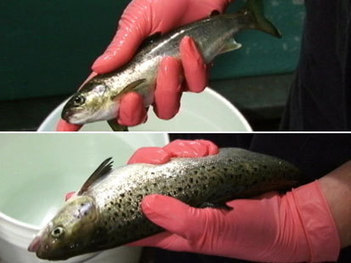
But it is one critics call “Frankenfish.” Read more here
Markey eyes fishing, opposes NOAA aquaculture “when it is failing its core fisheries mission to restore wild stocks, like cod, haddock and flounder.”
U.S. Rep. Edward J. Markey of Malden, who, along with Congressman Stephen Lynch of South Boston, has declared for the special election race to fill the seat long held by John F. Kerry, wrote to Acting Commerce Secr etary Rebecca Blank to advise against any NOAA approval of a pending proposal to regulate a future aquaculture farm in the Gulf of Mexico under the terms of the Magnuson-Stevens Act.”Congress did not intend for NOAA to regulate aquaculture as a fishery under the (Magnuson-Stevens Act),” Markey wrote. “I share the skepticism of fishermen in my home state of Massachusetts over NOAA”s ability to take on this additional responsibility.” Read more here
etary Rebecca Blank to advise against any NOAA approval of a pending proposal to regulate a future aquaculture farm in the Gulf of Mexico under the terms of the Magnuson-Stevens Act.”Congress did not intend for NOAA to regulate aquaculture as a fishery under the (Magnuson-Stevens Act),” Markey wrote. “I share the skepticism of fishermen in my home state of Massachusetts over NOAA”s ability to take on this additional responsibility.” Read more here
Aerial survey reveals marine, tsunami debris widespread across Alaska coast
Alaska Dispatch “Basically everywhere that we flew, we saw marine debris,” Veenstra said during a presentation on the survey results. The company also assembled an interactive map featuring some of the thousands images and their location. Read more here
Fishing for plastic in a peaceful sea: a journey through the Pacific Ocean ‘garbage patch’
As a marine biologist, and a veteran of some 800 research dives, Thom Young had heard quite a bit about the Pacific Ocean’s “garbage patch,” the quiet spots in the North Pacific Gyre where plastic accumulates amid rotating currents. On a Plastics at SEA voyage late last year, Young, a 33-year-old from Milwaukie, and 37 other crew members got to experience it firsthand. Read more here
Oregon – Wave energy a travesty of governmental process
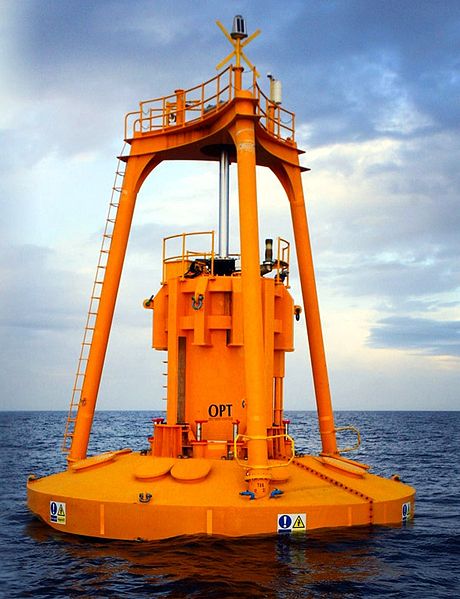 Three former Oregon State University undergrads have already received more than a half-million bucks in public money to build a wave energy facility near the Nestucca River north of Lincoln City. That’s why Oregon’s Department of Land Conservation and Development rammed the site through the Territorial Sea Plan process: The expenditures needed a justification. Read more here
Three former Oregon State University undergrads have already received more than a half-million bucks in public money to build a wave energy facility near the Nestucca River north of Lincoln City. That’s why Oregon’s Department of Land Conservation and Development rammed the site through the Territorial Sea Plan process: The expenditures needed a justification. Read more here
Does this sound familiar?
According to the industry body, the document adopted ignores the social and economic status of fishing. “It keeps backing an unbalanced, rigid and unrealistic fishery management, in which fleet, crew, industry and coastal communities become endangered species,” Read more here
From the Deckboss – Morisky appointed to Board of Fisheries
Gov. Sean Parnell has chosen Fairbanks resident Reed Morisky to replace Bill Brown on the state Board of Fisheries. Read more here, and as always, read the comments!
New size limits proposed for sharks – Proposed regulations would nearly double minimum size
OCEAN CITY — New regulations nearly doubling the minimum size for sharks are expected to have a big impact on the local fishing industry if passed as proposed. Campbell criticized the 96-inch limit when NOAA’s own literature said the sharks were mature at 93 inches. “You use science when you want to and then take a liberty here,” he said. “If this evidence was used in a court of law the judge would throw it out. Good management cannot be based on bogus numbers.” Read more here
Fishermen file suit over salmon management
United Cook Inlet Drift Association and Cook Inlet Fishermen’s Fund filed suit in District of Columbia District Court Jan. 18 over the transfer of salmon management from federal authorities to the state of Alaska.
Peter Shelley to NEFMC: Shut Down New England Cod Fishery
 Last Wednesday, January 30, the New England Fishery Management Council voted to cut catch limits for New England’s cod stocks by 66-71% from their 2012 levels. Conservation Law Foundation Senior Counsel Peter Shelley made this unplanned statement to the Council urging cautious management and asking them to consider shutting down the New England cod fishery so stocks can recover. Listen to audio of the entire meeting here. Read more here
Last Wednesday, January 30, the New England Fishery Management Council voted to cut catch limits for New England’s cod stocks by 66-71% from their 2012 levels. Conservation Law Foundation Senior Counsel Peter Shelley made this unplanned statement to the Council urging cautious management and asking them to consider shutting down the New England cod fishery so stocks can recover. Listen to audio of the entire meeting here. Read more here
Letters to the editor: An ill wind off the coast of Maine
The recent decision by the Maine Public Utilities Commission on a floating wind turbine project is bad for the state of Maine and Maine consumers (“Pioneering Maine wind project passes ‘biggest hurdle,'” Jan. 24). Read more here
Veazie dam removal project gets $1 million boost
 The Penobscot River Restoration Trust will receive a $1 million national coastal wetland conservation grant for dam removal and the restoration of habitat on nearly 300 acres of the Penobscot River, improving wetland habitats along the river for native sea-run fish, U.S. Sens. Susan Collins and Angus King and U.S. Reps. Mike Michaud and Chellie Pingree announced. Read more here
The Penobscot River Restoration Trust will receive a $1 million national coastal wetland conservation grant for dam removal and the restoration of habitat on nearly 300 acres of the Penobscot River, improving wetland habitats along the river for native sea-run fish, U.S. Sens. Susan Collins and Angus King and U.S. Reps. Mike Michaud and Chellie Pingree announced. Read more here
Coast Guard medevacs fisherman near Kodiak Island, Alaska
JUNEAU, Alaska — A Coast Guard Air Station Kodiak MH-60 Jayhawk helicopter crew medevaced a fisherman from the fishing vessel New Venture in the Shelikof Strait 95 miles west of Kodiak, Alaska, Wednesday. 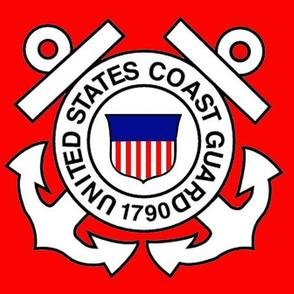 Read more here
Read more here
NOAA Regional Administrator John Bullard bemoans state of groundfish at Explorium talk
The session, the third in the Explorium’s Global Voice speaking series, was low-key, especially compared to the last few New England Fisheries Management Council meetings where Bullard has taken a lot of criticism for his ![]()
management decisions. Read more here
Fishery Advocate Bruce Tarr considers bid for John Kerry’s Senate seat.
This guy is all in when it comes to supporting the fishing industry. US fishermen on a national level could expect to find an unwavering supporter of their issues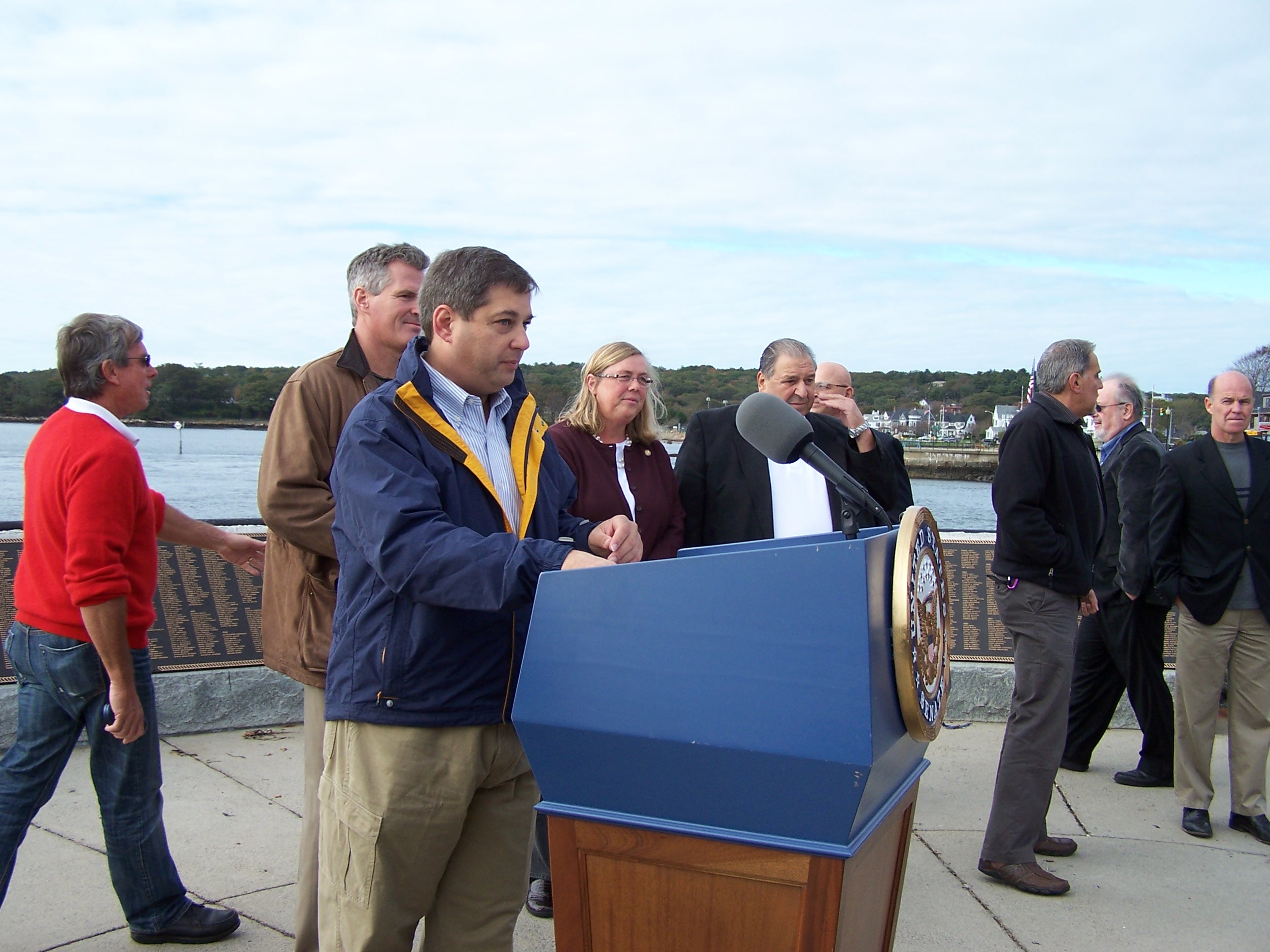
We have lost some of the bipartisan aligned politicians that we have been able to count on, and State Senator Tarr would be worthy addition to the coalition.
He has an excited bipartisan constituency pushing him to do it. Read more here.
Remembering the pilot boat ‘Can Do’
 GLOUCESTER — The Bible describes a time when the seas “mount up to the heaven” and then “go down again to the depths.” It was like that 35 years ago, in the midst of the Blizzard of ‘78. Nevertheless, Captain Frank Quirk Jr. of the pilot boat Can Do, out of Gloucester Harbor, answered a distress call, leading his four-man crew into the teeth of the storm. Read more here
GLOUCESTER — The Bible describes a time when the seas “mount up to the heaven” and then “go down again to the depths.” It was like that 35 years ago, in the midst of the Blizzard of ‘78. Nevertheless, Captain Frank Quirk Jr. of the pilot boat Can Do, out of Gloucester Harbor, answered a distress call, leading his four-man crew into the teeth of the storm. Read more here
Climate change changing marine landscape
Last summer, area fishermen were surprised to catch bonita fish and black sea bass off the local coast, neither of which normally venture further north than Cape Cod. That may not be so unusual in the future. This week, w ildlife experts from northern New England reported that warming temperatures have resulted in a variety of dramatic phenomenon in our region — ranging from tropical seahorses found in the Gulf of Maine to moose dying from severe infestations of ticks. Read more here
ildlife experts from northern New England reported that warming temperatures have resulted in a variety of dramatic phenomenon in our region — ranging from tropical seahorses found in the Gulf of Maine to moose dying from severe infestations of ticks. Read more here
R.I. Fishermen Rally for Counterparts in Alaska
“We’re reaching out to commercial fishermen on the East Coast because we need the nation’s support on this issue,” Carscallen said. “This is not a question of jobs versus the environment, but of protecting a thriving, lucrative established industry that yields high returns, year after year, for local communities in the Bristol Bay watershed, and the country. This is something that all commercial fishermen can relate to, and we appreciate the support of New England’s fleet.”
Read more here Commercial Fishermen for Bristol Bay
Voices of the exterminators and the exterminated .The New England Ground Fish Fleet
Just three years ago, the industry was told that the Gulf of Maine cod stock was rebounding and was expected to be fully rebuilt by 2014. The following year, they were told the models had been wrong and the stock was actually appro aching
aching
depletion. Fishermen continued to express concern with the science behind the stock assessments on Wednesday. “We’re not talking about, ‘Oh yeah, we’re going to have a tough year next year,’” “We’re talking about, you know, that’s it.’”David Goethel. Read more here
Commercial Crab Harvesters Plead Guilty to Fishing in U.S. Waters
Two commercial crab harvesters from Delta, British Columbia, have been fined a total of $27,000 and banned from participating in the Boundary Bay commercial crab fishing industry for 10 years, after pleading guilty to offences related to harvesting crab in American waters. Read more here
New Documentary ‘Dirty Energy’ highlights dangerous role of dispersants in BP’s cleanup effort
 In the movie, marine toxicologist Riki Ott summarized what the oil industry learned from the Exxon Valdez spill in Alaska in 1989: “We have to control the images. We’ve got to minimize the appearance of damages. That will limit our liability.”
In the movie, marine toxicologist Riki Ott summarized what the oil industry learned from the Exxon Valdez spill in Alaska in 1989: “We have to control the images. We’ve got to minimize the appearance of damages. That will limit our liability.”
That’s what BP did in the Gulf. “If you disperse it, you don’t see it,” said shrimper George Barisich, who attended the screening of “Dirty Energy” in Port Huron on Jan. 19. “As they dispersed it more and more, the less people saw, the more they forgot about it.” Read more here
Our view: Bay State’s ‘Sacred Cod’ has become NOAA’s sacred cow
 Yes, NOAA can show “scientific” data suggesting that these dire cuts — up to 77 percent for the Gulf of Maine cod catch — may be necessary. Yet NOAA also had 2008 survey data that showed many of the cod stocks were already rebuilt. And NOAA’s latest data is off an assessment model that did not include any input from fishermen, meaning it’s no more credible than the admittedly bogus data used in the “Trawlgate” fiasco of 1999-2000, when NOAA conceded its statistics were hopelessly flawed, yet still used them to set stock limits. Read more here
Yes, NOAA can show “scientific” data suggesting that these dire cuts — up to 77 percent for the Gulf of Maine cod catch — may be necessary. Yet NOAA also had 2008 survey data that showed many of the cod stocks were already rebuilt. And NOAA’s latest data is off an assessment model that did not include any input from fishermen, meaning it’s no more credible than the admittedly bogus data used in the “Trawlgate” fiasco of 1999-2000, when NOAA conceded its statistics were hopelessly flawed, yet still used them to set stock limits. Read more here
Opinion – Hard realities for New England fishermen
 For decades the waters off New England have been subject to some of the most intense fishing pressure and environmental impacts of any body of water in the world. These impacts include shipping traffic, pollution, loss of habitat, and myriad other factors. Researchers at the University of California Santa Barbara’s Marine Science Institute determined in a study titled, “A Global Map of Human Impact on Marine Ecosystems,” that the Gulf of Maine and environs had suffered an overall degradation of more than 90 percent compared to their pristine state. The worst of this has occurred in the last 50 years. Read more here!
For decades the waters off New England have been subject to some of the most intense fishing pressure and environmental impacts of any body of water in the world. These impacts include shipping traffic, pollution, loss of habitat, and myriad other factors. Researchers at the University of California Santa Barbara’s Marine Science Institute determined in a study titled, “A Global Map of Human Impact on Marine Ecosystems,” that the Gulf of Maine and environs had suffered an overall degradation of more than 90 percent compared to their pristine state. The worst of this has occurred in the last 50 years. Read more here!
Harmful Red Tide to Sweep Across Southwest Florida
Red tides can also be harmful to marine life. Reports of dead fish have already been received from Charlotte County, Fla. Read more here
Editorial – Save the fish, but also help the fishermen
This newspaper understands the angry response severe restrictions provoked among those whose families have earned their living from the sea for generations – “I’m leaving here in a coffin,” one fisherman from New Bedford, Mass., complained – but the council had no viable options…..We encourage NOAA to adopt the restrictions, as painful as they will be to New England fishermen, since they are the best way to give cod, now on the verge of extinction, a chance to replenish. Read more here at The Day
One fisherman’s tale shows plight of many -Richard Gaines – gloucester daily times
For a gillnet fisherman, these are trying times — with worse yet to come. Captain Don Smith, a 57-year-old transplanted Mainer whose family roots are in Nova Scotia and has fished commercially from Gloucester for more than 30 y ears, doesn’t need to be prodded to speak to that…… Making life more difficult for the small boats are the big boats; these “trip” boats that traditionally worked offshore on the more distant Georges Bank. But the catch share trading system imposed by federal regulators in 2010 has liberated them to acquire quota from non-participants or day boats, and — no longer limited by daily catch limits —they have been induced to chase the pulses of cod onto Stellwagen, where they flaunt their scale and have their way. Read more here
ears, doesn’t need to be prodded to speak to that…… Making life more difficult for the small boats are the big boats; these “trip” boats that traditionally worked offshore on the more distant Georges Bank. But the catch share trading system imposed by federal regulators in 2010 has liberated them to acquire quota from non-participants or day boats, and — no longer limited by daily catch limits —they have been induced to chase the pulses of cod onto Stellwagen, where they flaunt their scale and have their way. Read more here






 Pretty snazzy.
Pretty snazzy. 
 Vito Giacalone, president of the Gloucester Fishing Community Preservation Fund, has been cleared of any wrongdoing by former attorney general L. Scott Harshbarger after a three-month investigation. But that does not mean Giacalone is happy with what he found in Harshbarger’s report. In fact, he said, he was astonished to read — for the first time — details of the allegations against him, such as charges of misappropriation of funds and exerting improper influence on fishermen.
Vito Giacalone, president of the Gloucester Fishing Community Preservation Fund, has been cleared of any wrongdoing by former attorney general L. Scott Harshbarger after a three-month investigation. But that does not mean Giacalone is happy with what he found in Harshbarger’s report. In fact, he said, he was astonished to read — for the first time — details of the allegations against him, such as charges of misappropriation of funds and exerting improper influence on fishermen. 


























